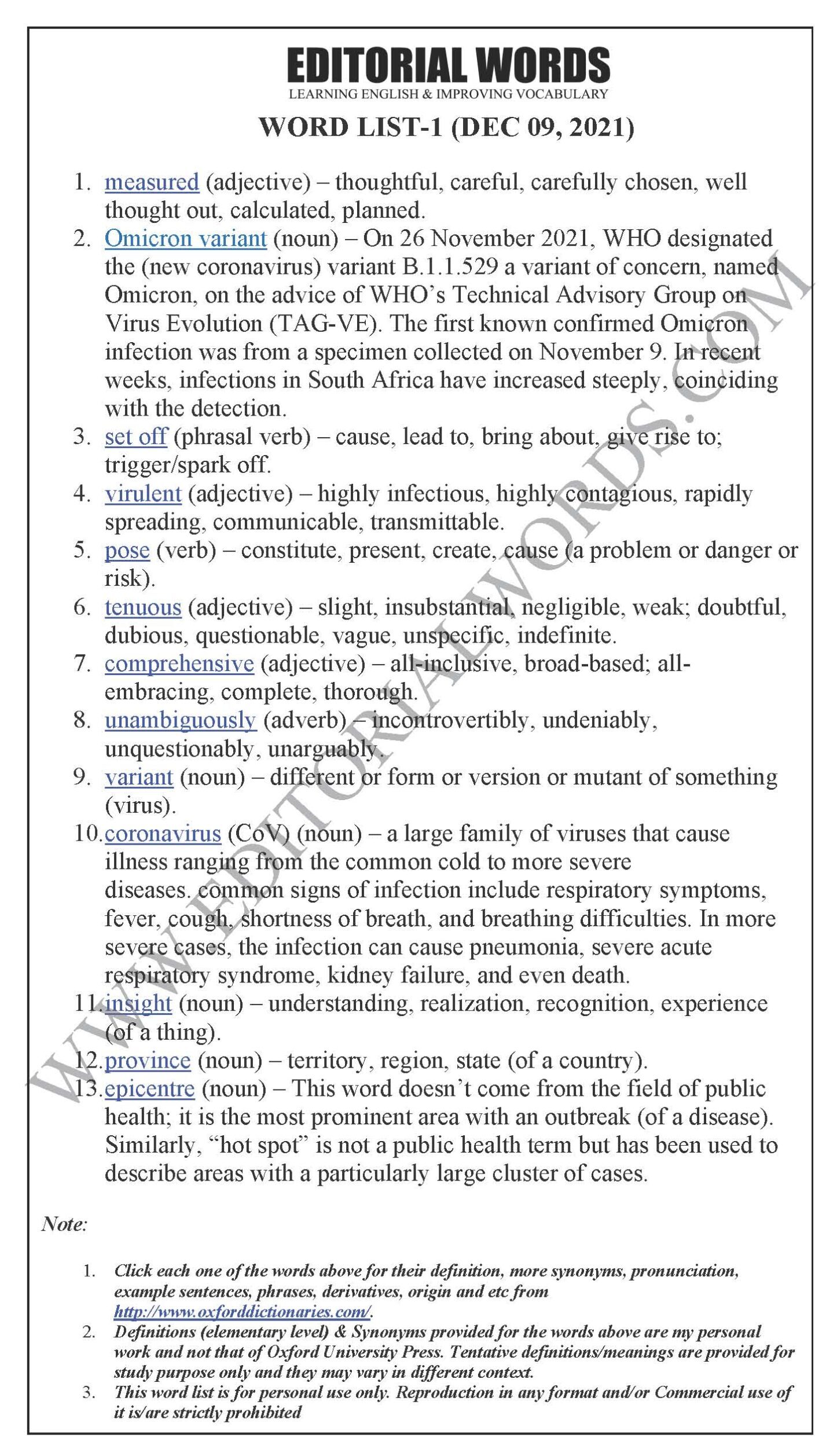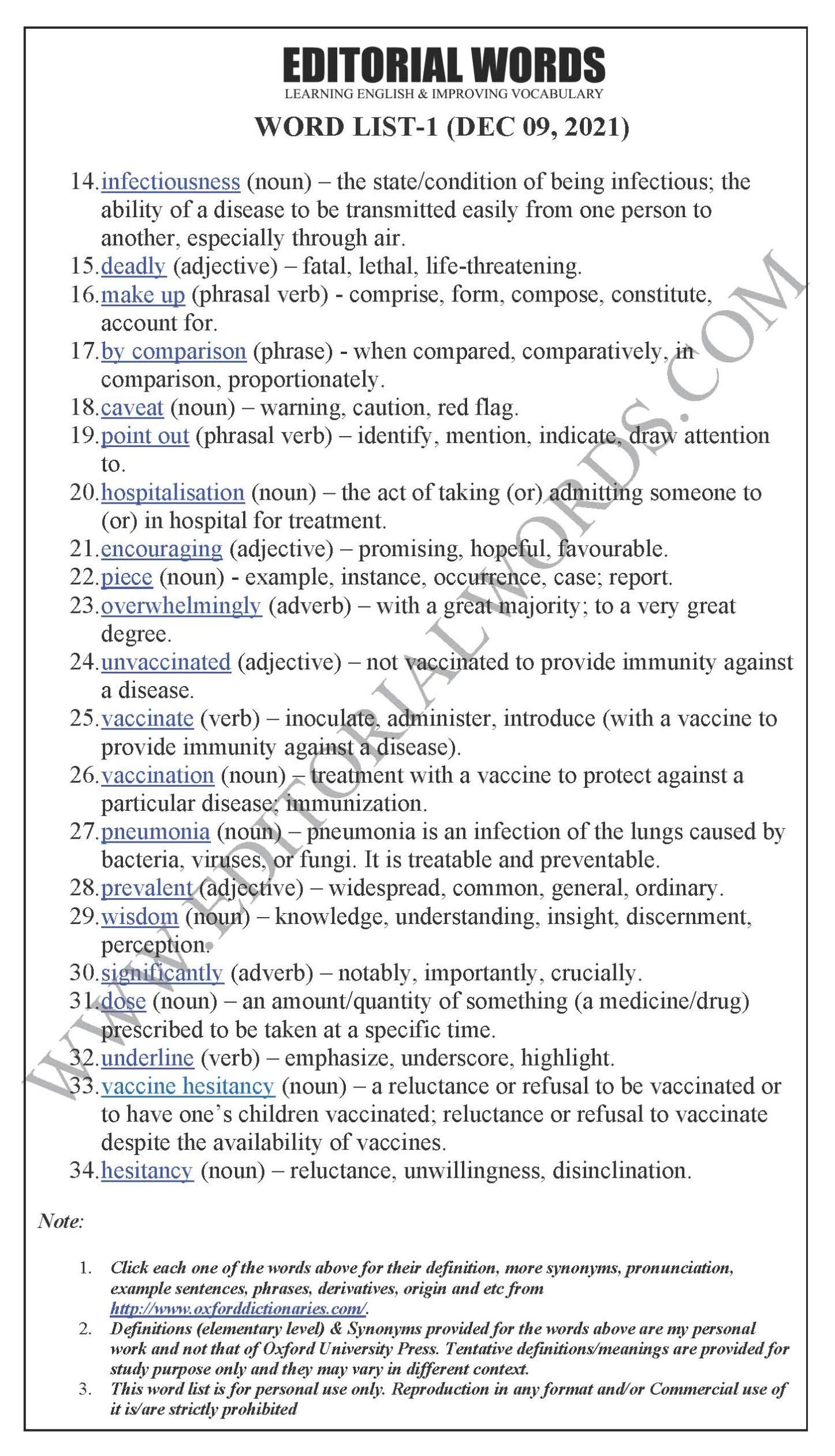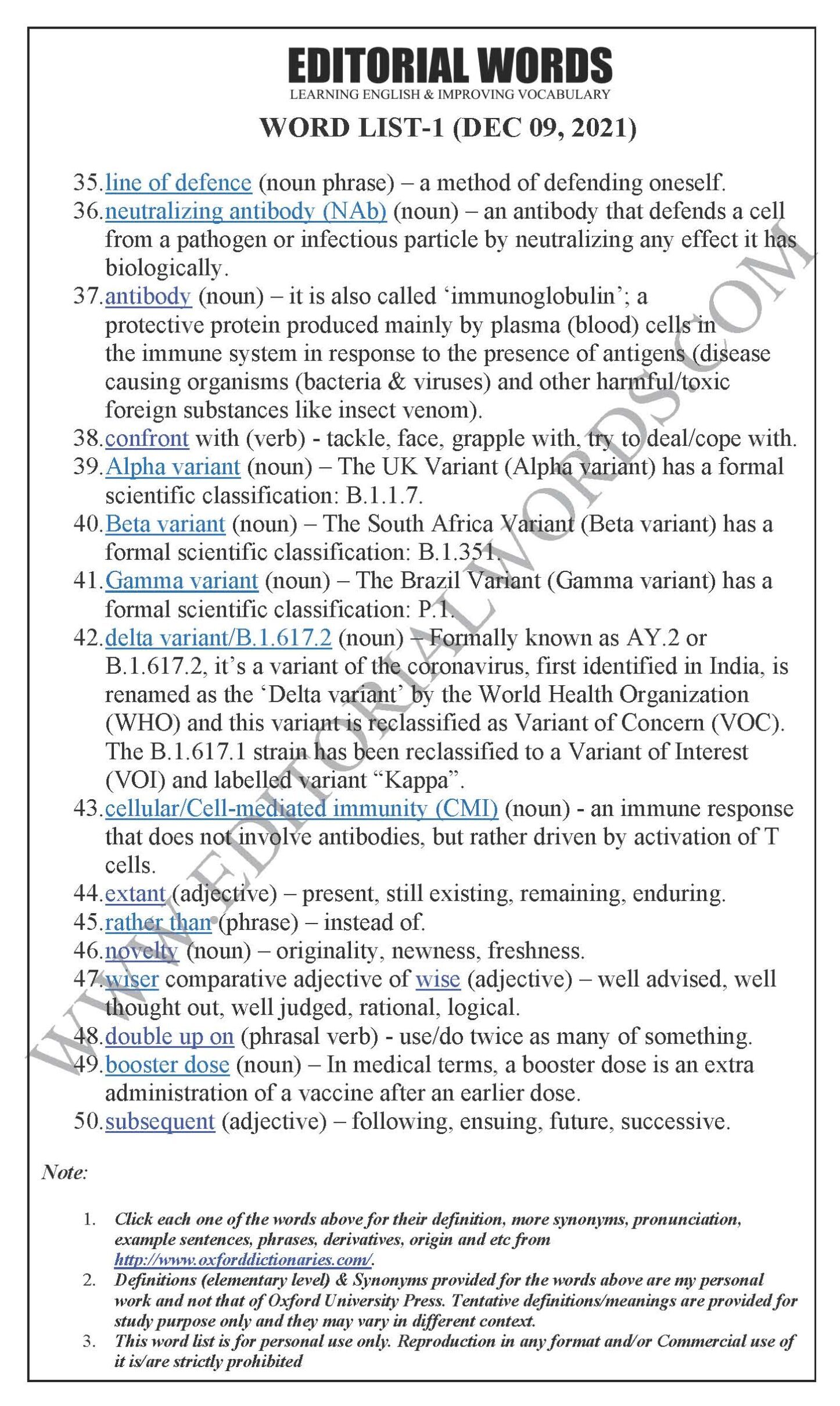The Hindu Editorial (A measured response) – Dec 09, 2021
The threat posed by Omicron is tenuous and it will still be a few weeks before a comprehensive understanding of it emerges, but what is known unambiguously… For further reading, visit “The Hindu”. Below is today’s word list-1 for The Hindu Editorial (A measured response) – Dec 09, 2021.
To read this article, click “The Hindu”.
This preview is provided here with permission.
Courtesy: The Hindu
The Hindu Editorial (A measured response) – Dec 09, 2021:
- measured (adjective) – thoughtful, careful, carefully chosen, well thought out, calculated, planned.
- Omicron variant (noun) – On 26 November 2021, WHO designated the (new coronavirus) variant B.1.1.529 a variant of concern, named Omicron, on the advice of WHO’s Technical Advisory Group on Virus Evolution (TAG-VE). The first known confirmed Omicron infection was from a specimen collected on November 9. In recent weeks, infections in South Africa have increased steeply, coinciding with the detection.
- set off (phrasal verb) – cause, lead to, bring about, give rise to; trigger/spark off.
- virulent (adjective) – highly infectious, highly contagious, rapidly spreading, communicable, transmittable.
- pose (verb) – constitute, present, create, cause (a problem or danger or risk).
- tenuous (adjective) – slight, insubstantial, negligible, weak; doubtful, dubious, questionable, vague, unspecific, indefinite.
- comprehensive (adjective) – all-inclusive, broad-based; all-embracing, complete, thorough.
- unambiguously (adverb) – incontrovertibly, undeniably, unquestionably, unarguably.
- variant (noun) – different or form or version or mutant of something (virus).
- coronavirus (CoV) (noun) – a large family of viruses that cause illness ranging from the common cold to more severe diseases. common signs of infection include respiratory symptoms, fever, cough, shortness of breath, and breathing difficulties. In more severe cases, the infection can cause pneumonia, severe acute respiratory syndrome, kidney failure, and even death. (Courtesy: WHO)
- insight (noun) – understanding, realization, recognition, experience (of a thing).
- province (noun) – territory, region, state (of a country).
- epicentre (noun) – This word doesn’t come from the field of public health; it is the most prominent area with an outbreak (of a disease). Similarly, “hot spot” is not a public health term but has been used to describe areas with a particularly large cluster of cases.
- infectiousness (noun) – the state/condition of being infectious; the ability of a disease to be transmitted easily from one person to another, especially through air.
- deadly (adjective) – fatal, lethal, life-threatening.
- make up (phrasal verb) – comprise, form, compose, constitute, account for.
- by comparison (phrase) – when compared, comparatively, in comparison, proportionately.
- caveat (noun) – warning, caution, red flag.
- point out (phrasal verb) – identify, mention, indicate, draw attention to.
- hospitalisation (noun) – the act of taking (or) admitting someone to (or) in hospital for treatment.
- encouraging (adjective) – promising, hopeful, favourable.
- piece (noun) – example, instance, occurrence, case; report.
- overwhelmingly (adverb) – with a great majority; to a very great degree.
- unvaccinated (adjective) – not vaccinated to provide immunity against a disease.
- vaccinate (verb) – inoculate, administer, introduce (with a vaccine to provide immunity against a disease).
- vaccination (noun) – treatment with a vaccine to protect against a particular disease; immunization.
- pneumonia (noun) – pneumonia is an infection of the lungs caused by bacteria, viruses, or fungi. It is treatable and preventable.
- prevalent (adjective) – widespread, common, general, ordinary.
- wisdom (noun) – knowledge, understanding, insight, discernment, perception.
- significantly (adverb) – notably, importantly, crucially.
- dose (noun) – an amount/quantity of something (a medicine/drug) prescribed to be taken at a specific time.
- underline (verb) – emphasize, underscore, highlight.
- vaccine hesitancy (noun) – a reluctance or refusal to be vaccinated or to have one’s children vaccinated; reluctance or refusal to vaccinate despite the availability of vaccines.
- hesitancy (noun) – reluctance, unwillingness, disinclination.
- line of defence (noun phrase) – a method of defending oneself.
- neutralizing antibody (NAb) (noun) – an antibody that defends a cell from a pathogen or infectious particle by neutralizing any effect it has biologically.
- antibody (noun) – it is also called ‘immunoglobulin’; a protective protein produced mainly by plasma (blood) cells in the immune system in response to the presence of antigens (disease causing organisms (bacteria & viruses) and other harmful/toxic foreign substances like insect venom).
- confront with (verb) – tackle, face, grapple with, try to deal/cope with.
- Alpha variant (noun) – The UK Variant (Alpha variant) has a formal scientific classification: B.1.1.7.
- Beta variant (noun) – The South Africa Variant (Beta variant) has a formal scientific classification: B.1.351.
- Gamma variant (noun) – The Brazil Variant (Gamma variant) has a formal scientific classification: P.1.
- delta variant/B.1.617.2 (noun) – Formally known as AY.2 or B.1.617.2, it’s a variant of the coronavirus, first identified in India, is renamed as the ‘Delta variant’ by the World Health Organization (WHO) and this variant is reclassified as Variant of Concern (VOC). The B.1.617.1 strain has been reclassified to a Variant of Interest (VOI) and labelled variant “Kappa”.
- cellular/Cell-mediated immunity (CMI) (noun) – an immune response that does not involve antibodies, but rather driven by activation of T cells.
- extant (adjective) – present, still existing, remaining, enduring.
- rather than (phrase) – instead of.
- novelty (noun) – originality, newness, freshness.
- wiser comparative adjective of wise (adjective) – well advised, well thought out, well judged, rational, logical.
- double up on (phrasal verb) – use/do twice as many of something.
- booster dose (noun) – In medical terms, a booster dose is an extra administration of a vaccine after an earlier dose.
- subsequent (adjective) – following, ensuing, future, successive.
Note:
1. Click each one of the words above for their definition, more synonyms, pronunciation, example sentences, phrases, derivatives, origin and etc from http://www.oxforddictionaries.com/.
2. Definitions (elementary level) & Synonyms provided for the words above are my personal work and not that of Oxford University Press. Tentative definitions/meanings are provided for study purpose only and they may vary in a different context.
3. This word list is for personal use only. Reproduction in any format and/or Commercial use of it is/are strictly prohibited.
The Hindu Editorial (A measured response) – Dec 09, 2021:



“Phrasal Verbs” We Learnt Last Week
“Idioms & Phrases” We Learnt Last Week
“Important Definitions” We Learnt Last Week
Recent Word Lists For The Hindu Editorial Articles

Be the first to comment